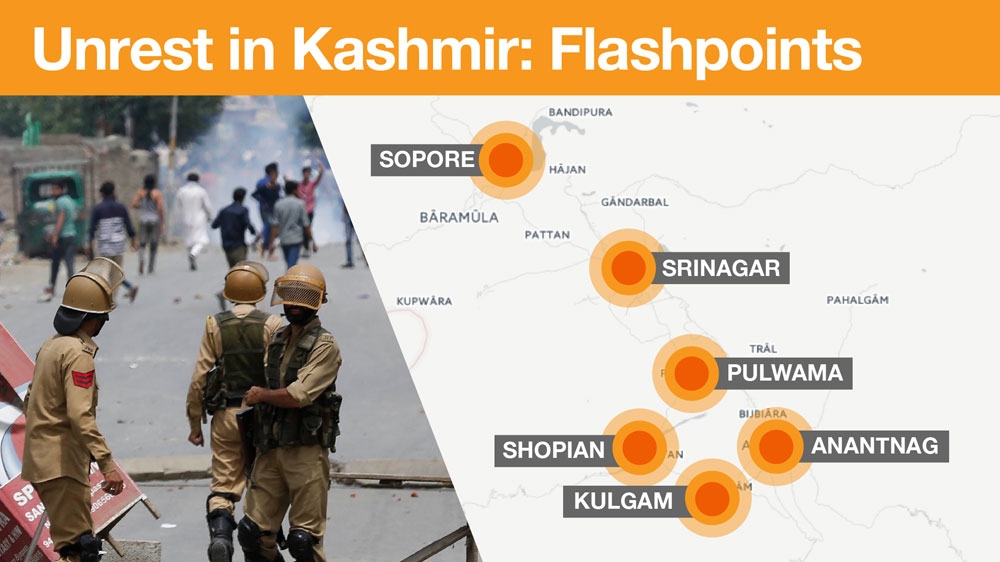Kashmir and Palestine: The Story of Two Occupations
IN FOCUS, 29 Aug 2016
 The growing pockets of solidarity expressed for Kashmiris are heartening, as is the solidarity for Palestinian struggle.
The growing pockets of solidarity expressed for Kashmiris are heartening, as is the solidarity for Palestinian struggle.
24 Aug 2016 – The India and Israel alliance has been described as a full-blown romance, but the ongoing siege of Kashmir makes this a bloody affair – covert for years.
India has bought arms from Israel since the 1960s. Indian Prime Minister Narendra Modi is to visit Israel in 2017, marking the 25th anniversary of full diplomatic relations.
The two nations are passionate about their brutal occupations of Kashmir and Palestine. India is one of Israel’s biggest arms exports clients, spending about $10bn over the past decade. Indian police forces have been receiving training in Israel for “anti-terror” operations, which Israeli conducts against Palestinians.
The ongoing unrest in Kashmir
Writing in the Middle East Review of International Affairs in 2004, Harsh Pant, professor of international relations at King’s College London, frames the self-determination struggles in Kashmir and Palestine within a post-9/11 narrative of the “global scourge of Islamist terrorism”.
This terror frame supports the economy of arms trade between India, Israel and the United States. In this story, the aggressive religious nationalisms of Zionism and Hindutva are neutral shared security interests. Kashmiri and Palestinian quests for self-determination are reduced to neighbouring Muslim or Arab states causing unrest.
The current siege of Kashmir by India’s forces follows the killing of Hizbul Mujahideen commander Burhan Wani on July 8.
We live in a time when nation-states overtly commit war crimes, are cheered on by bloodthirsty majoritarian citizens, and literally get away with murder.
Kashmiris came out in thousands to mourn the event. Kashmiri writers and journalists say that the savage response of the Indian state to the popular crowd support for the slain militant was unprecedented.
The pellet gun, a weapon banned in many countries, was used to blind and maim hundreds from a one-year-old child to the elderly.
The dead numbered more than 70, and 6,000 or more were injured. These numbers continue to rise. Yet, Kashmiris continue to protest against the Indian state and call for Azadi (freedom).
![Kashmiri activists hold placards during a protest against Israel's military operation in Gaza on July 11, 2014, in Srinagar [Getty]](https://www.transcend.org/tms/wp-content/uploads/2016/08/kashmir-palestine-india-israel.jpg)
Kashmiri activists hold placards during a protest against Israel’s military operation in Gaza on July 11, 2014, in Srinagar [Getty]
Occupation and occupiers
These current events must be placed in a longer context. Since the 1990s, through a decade of armed struggle against the Indian state, state violence in Kashmir has taken its toll.
There are about 500,000 military personnel in the region – in other words, one soldier for 25 civilians. The Jammu and Kashmir Coalition of Civil Society reports more than 70,000 killings, about 10,000 enforced disappearances and 7,000 mass graves (PDF).
Torture, rape, sexual violence, enforced disappearances, and extra-judicial killings are widespread. These human rights violations are intricately linked to the denial of political sovereignty for Kashmiris.
We desperately need to reconsider our West versus non-West understanding of the geography of colonialisms. The years 1947 and 1948 mark the creation of the nation-states of India and Israel. These years scar Kashmiris and Palestinians.
Palestinians have been dispossessed of territory and many forced into exile. Kashmir was handed over from an unpopular ruler without the legitimacy of popular vote to the Indian state on October 26, 1947.
A condition of that accession is the United Nations resolution of 1948 for referendum or plebiscite, never facilitated by the Indian state. Israel and India thus inaugurate the colonial occupations of Palestine and Kashmir.
Uneven scale of atrocities
When is an occupation not an occupation? When it is executed by one of the world’s largest markets? When is a butcher not a butcher? When he is a prime minister; or when he is an ally?
Let’s not forget that Modi was denied a visa to the US in 2005 for his alleged responsibility over the mass murder of Muslims during the Gujarat riots. His nickname, the “Butcher of Gujarat”, comes from that 2002 event. He can now add the title of the “Butcher of Kashmir” to his name – even as that title fits previous Indian prime ministers.
OPINION: Two centuries of oppression in Kashmir
Israeli Prime Minister Benjamin Netanyahu, like his predecessors, can be named the “Butcher of Palestinians” as he presided over the brutal bombing of Gaza in 2014 that killed 2,100 Palestinians, a third of them children.
The Israeli dead listed 66 soldiers and seven civilians. This uneven scale led the UN Inquiry of Gaza to lay the weight of the charge of war crimes on Israel even as they also charged listed Palestinian armed groups.
The US was the sole vote against the UN inquiry, and European countries abstained, as did India. The Gaza bombing was not the first and it is not the last as the violence of occupation continues in Palestine daily in the form of illegal settlements and killings.
Greater need for solidarity
We live in a time when nation-states overtly commit war crimes, are cheered on by bloodthirsty majoritarian citizens, and literally get away with murder.
The word democracy glitters like fool’s gold on the tongues of world leaders. Human rights regimes seem toothless in the face of the bold barbarisms of nation-states invested in repressing democracy, and need reform if they are to deliver justice.
And so transnational solidarity and activism are urgent when almost every nation-state seems rogue.
The small but growing pockets of solidarity expressed for Kashmiris are heartening, as is the international solidarity for Palestinian struggle.
Joining the dots between the occupations of Kashmir and Palestine shows the need for a greater solidarity between these two sovereignty struggles.
_________________________
Goldie Osuri is associate professor of sociology at the University of Warwick, UK. She is the author of Religious Freedom in India: Sovereignty and (Anti) Conversion.
Go to Original – aljazeera.com
DISCLAIMER: The statements, views and opinions expressed in pieces republished here are solely those of the authors and do not necessarily represent those of TMS. In accordance with title 17 U.S.C. section 107, this material is distributed without profit to those who have expressed a prior interest in receiving the included information for research and educational purposes. TMS has no affiliation whatsoever with the originator of this article nor is TMS endorsed or sponsored by the originator. “GO TO ORIGINAL” links are provided as a convenience to our readers and allow for verification of authenticity. However, as originating pages are often updated by their originating host sites, the versions posted may not match the versions our readers view when clicking the “GO TO ORIGINAL” links. This site contains copyrighted material the use of which has not always been specifically authorized by the copyright owner. We are making such material available in our efforts to advance understanding of environmental, political, human rights, economic, democracy, scientific, and social justice issues, etc. We believe this constitutes a ‘fair use’ of any such copyrighted material as provided for in section 107 of the US Copyright Law. In accordance with Title 17 U.S.C. Section 107, the material on this site is distributed without profit to those who have expressed a prior interest in receiving the included information for research and educational purposes. For more information go to: http://www.law.cornell.edu/uscode/17/107.shtml. If you wish to use copyrighted material from this site for purposes of your own that go beyond ‘fair use’, you must obtain permission from the copyright owner.

We learn little from mainstream media outlets about Kashmir. Thank you Goldie for this. I hope we can learn more on TMS.
There is no doubt, Israel-Palestine conflict is mother of all modern day conflicts. It has not only served as an epicenter of all so called global terrorism. but put entire world society at a stake. Had, the world community especially US diligently listened Palestinian cries with true human heart, and helped resolve this conflict, this world be a better place to live. The roots of 9/11 go to Palestinian conflict that multiplied the human sufferings manifold. Deliberate destruction of Muslim nations and killing millions, led a refugees invasion back of Europe and US, is nothing but, result of wrong and vision-less war strategies of US, UK and Israel. The Israel-India arms cooperation could not help resolve any conflict in past seventy years except maintaining a fragile peace that too is full of human blood and human sufferings and violation of human rights in immense proportions. Had these territories not been Muslim dominated, they would have been freed by world community(UN) long back like South Sudan and East Timor but biased approaches of world community have never helped these region to get independence. Kashmir which is under curfew for past 50 days, perhaps longest in contemporary world, whose fate is based on plebiscite, and which has been equally exploited by Pakistan for its vested interests, also depicts a sorry sate of affairs. It is occupied both by India and Pakistan, and if India frees, there is no assurance if Pakistan will also follow the path. I think instead of favoring India, Israel must use its influence to resolve the Kashmir dispute, and in the same manner India must pressurize Israel to free Palestinian territory, that is the need, otherwise thinking on traditional lines will be no help except continuing tyranny on innocent fellow humans. All in All, the above article is very balanced approach, yet Israeli point of view about Palestine and Pakistan occupation of Kashmir should also be underlined.
Goldie Osuri’s analogy fails at several levels. But the most important is that she tries to paint it up as a India-Kashmir problem alone. Kashmir is controlled by 3 countries. Pakistan, India and China. All 3 countries have responsibilities they have ignores, all 3 countries need to work together in order to obtain and build trust and peace. Kashmir is more than innocent Moslims being massacred by evil Indian troops. It is also a story of the Hindi, Sikh and Buddist being persecuted and killed. Where is Goldie’s account of the ethnic cleansing of the Pandits?
All need to work together for peace. But all also need to acknowledge the scope and and context of the conflict first.
Goldie Osuri needs to understand that the today’s Kashmir problem is the creation of the then Prime Minister Pandit Jawahar Lal Nehru. He had simply let Pakistan occupy part of Kashmir.